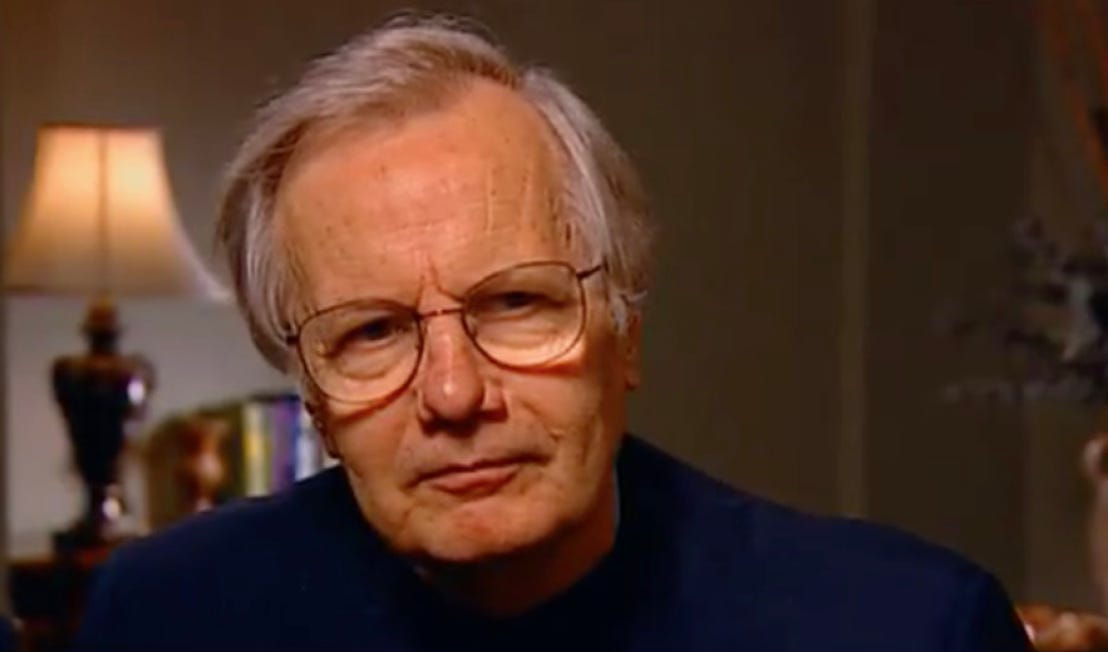For the best take on Bill Moyers, who just passed away at 91, see “The Power of Myth,” in the August 18, 1991 issue of The New Republic (TNR) subtitled “Bill Moyers, liberal fraud.” As author Andrew Ferguson explained:
The Texas Monthly says he is “the standard bearer of the best we see in ourselves.” Jennifer Lawson, programming chief of PBS, says he is a “national treasure.” Jackie Onassis calls him one of her heroes. Barbara Jordan takes it a step further: “I’d like to see him as president.” She is not alone.
He has, for example, used Republican scandals as occasions for sermons about betrayals of trust, government run amok, even as his own involvement in one of the seamier episodes of government malfeasance slips quietly down the memory hole. [President Lyndon] Johnson once called Moyers “my vice president in charge of everything.” By all accounts the tag was accurate.
According to classified documents unearthed by the Church Committee on intelligence abuses in 1976, and others obtained by David Garrow for his The FBI and Martin Luther King (1981), while at the White House Moyers tracked the bureau’s infamous campaign against King.
As the campaign against King progressed, FBI Director J. Edgar Hoover routinely forwarded to the White House summaries of the King wiretaps, which were placed not only in King's home and office but also in his hotel rooms around the country. The summaries covered not only King's dealings with associates but also his sexual activities. After receiving one such summary, Moyers instructed the FBI to disseminate it widely throughout the executive branch, to Dean Rusk. Robert McNamara, Carl Rowan, and many others. Moyers was also aware at the time of Hoover's efforts to leak the King material to the press. . .
Since forming his own production company, Public Affairs Television, Inc., (PAT) in 1986, Moyers has produced 136 hours of television.
These days Moyers is increasingly distracted from the affairs of state by the lure of spiritualism and pop psychology. Moyers's greatest discovery in this area was Joseph Campbell, a professor at Sarah Lawrence and a veteran of the New Age circuit of self-realization workshops. Among Campbell’s groupies was the movie producer George Lucas, and it was on Lucas’s California ranch that Moyers and Campbell filmed much of the six-hour-long special “The Power of Myth with Bill Moyers.”
The show was a stunning success by the fragile standards of PBS. Viewership, according to PBS. topped 30 million. The series’ companion volume was on the best-seller lists for seventy-four weeks. . .The kicker is that all this indulgence is made possible through a generous grant from the public.
The flow of funds within the hermetic world of public TV is one of its tightest secrets. (Though government-funded, the Corporation for Public Broadcasting is exempt from the Freedom of Information Act.) Moyers himself says only, “I’ve been lucky. I’ve always made a nice living.”
Moyers draws the bulk of his funding from two sources: mostly left-leaning tax-exempt foundations and corporate sponsors. Since tax-exempt foundations are forbidden by law from supporting for-profit enterprises, the money is given to a middleman--in Moyers’s case, usually WNET “in support of" particular programming.” The middleman then contracts with the production company to produce the shows.
For Moyers, the costs apparently include not only his own salary but his wife Judith’s, president of PAT (usually listed as “executive producer’ or series consultant” on his shows), and on at least one show his son Cope's (“researcher”). In other businesses this circuitous routing of funds would be called money-laundering. Within the cloisters of PBS, it's business as usual – and, of course, perfectly legal.
Television tie-ins – books and tapes adapted from broadcast shows – can bring in still more money, and here too Moyers has been a leader. The practice of profiting from these “after-sales” is controversial even within the public broadcasting establishment. One independent producer critical of “tie-ins,” Larry Adelman, has written that “the program itself [becomes] an ideal commercial for the cassette (and book, record, and other program tie-ins). And unlike thirty-second [commercials], it’s guaranteed to be watched (“previewed”) by those already interested in the product.” Moyers demurs: “There's some money in those sales. Not a lot.”
As the Los Angeles-based watchdog group COMINT has documented, the Campbell series has sold a whopping 200,000 cassettes through PBS Video, which pays a royalty of at least 30 percent (Moyers splits royalties with his two co-producers). “A Gathering of Men” has sold at least 48,000 units, at a price of $39.95. The cheaper “Amazing Grace,” another Moyers show, has sold 48,000. The books also do well. Seven Locks Press sold more than 40,000 copies of a spin-off from “The Secret Government,” one of Moyers's Iran-contra shows, with Moyers again sharing royalties with his co-producer.
The truest model for a Moyers candidacy is perhaps that of Pat Robertson. Like the Rev. Robertson, Moyers has left behind a seamy past to take to the airwaves, where he tells tall tales to the gullible, appropriating their confusions, only to administer a salve of undemanding reassurance. And like Robertson, Moyers has made a nice living doing so, masterfully employing all the techniques of the video age.
Moyers taps the public trough through tax-free foundations and tax-write-off corporate donations, and a government-subsidized network whose devotion to him is boundless. And whereas Robertson's religion relies on a historical tradition and common text against which it can be measured and criticized, the spiritualism that Moyers has lately been retailing comprehends only the unfalsifiable whims of pop shrinks, elastic and malleable. Neither, it’s safe to say, is a credible guide for politics or life. To the apolitical among us Bill Moyers is an Elmer Gantry of the New Age. To the Democrats, he is a Henry Wallace for the 1990s.
And so on, prompting Moyers to spend $9,000 on a TNR ad in response. Full disclosure: COMINT was a project of the Center For the Study of Popular Culture, which David Horowitz established after the Second Thoughts Conference in 1987. The CSPC became the David Horowitz Freedom Center and its flagship publication, Heterodoxy, became Frontpage Magazine.
David Horowitz passed away in April at the age of 85. Not a dollar of public money was involved in Radical Son, or any of the best-sellers David wrote with Peter Collier, who passed away in 2019.






I recall in 77(?) Bill Moyers interviewed Ronald Reagan. It Made me A Reagan Fan and accelerated my move to The Right.
Moyers always came across as preachy, condescending and sanctimonious. Nobody normal could watch more than five minutes of him at a time.